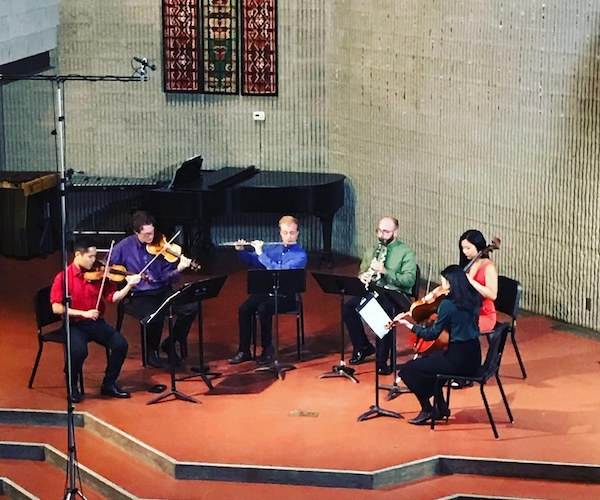Concert Review: Juventas New Music’s “Pride: Hand in Hand”
By Jonathan Blumhofer
The six pieces hailed from various corners of the country and examined a wide range of expressive and social viewpoints.

The Juventas New Music Ensemble in action at First Church Boston.
Juventas New Music Ensemble wrapped up its fourteenth season Saturday night at First Church Boston. The theme for the year was “American Dream,” and it focused on topical political and cultural concerns. This weekend’s finale, Pride: Hand in Hand, continued the trend, celebrating and showcasing the work of LGTBQ+ composers.
The six pieces on Saturday’s program hailed from various corners of the country and examined a wide range of expressive and social viewpoints.
On one end of the spectrum was Diana Voyer’s Shapes, a three-movement horn trio that explored the concept of dualities, these particularly informed by the composer’s own struggles with dysphoria.
Each movement built to a climactic, primal scream, but came to its apex by different approaches. In the first movement, “Lontano,” a sinuous horn line led to a series of chromatic dialogues between the instruments. The second movement, “Tranquillo,” was anything but, with an ominous piano ostinato underlining a succession of fragmented melodic lines above. And the finale, “Ansiosamente,” was marked by a driving, mechanistic violin figure.
Throughout, Voyer’s writing evinced a strong sense of structure and character. The involved horn part, in particular, was terrifically catching – and was brilliantly executed by Anne Howarth.
Then there was Dennis Tobenski’s Only Air. A setting of a Kathryn Levy poem conceived as a memorial to bullied LGBTQ teens who took their lives, Only Air alternates somewhat spare and angular text settings with a sequence of five instrumental interludes.
Saturday’s performance, sung by Kelley Hollis and conducted by Andy Pease, ably played up the contrasts of texture and mood between these alternating sections. In so doing, though, the richness and range of the instrumental episodes (highlighted by a recurring, diabolical scherzando over Only Air’s second half) ended up overwhelming the impression of the score’s vocal portion. I couldn’t help thinking that, perhaps, the former ought to be allowed to stand on their own.
Hailing from the other end of the topical gamut was Juventas artistic director Oliver Caplan’s Love Letters. A set of three instrumental movements that Caplan wrote for his wedding in 2015, they’re a sweet and songful triptych.
Letters’ first movement, “Forever Began with Hello,” featured some smartly dovetailed exchanges between woodwinds (flute and clarinet) and violin. The last, “Two Penguins in Love,” gamboled spiritedly. In between came “The Tree with the Lights in It,” a beautifully constructed interlude highlighted by a burbling, Finzi-like clarinet part.
Wolcott Humphrey executed the last perfectly, while Nicholas Southwick’s flute solos and Kiyoshi Hayashi’s violin playing filled out the evening’s best-blended (and -balanced) ensemble work.
Southwick also had a star solo turn in Ingrid Stölzel’s The Voice of the Rain, a meditation on Walt Whitman’s poem ruminating on the creative process. In it, a flutist, cellist, and percussionist (alternating between marimba and vibraphone), echo and develop a set of melodic ideas. The result is a rich-toned, delicately scored, often canonic-sounding study that, on Saturday, was fervently played by Southwick, cellist Minjin Chung, and percussionist Nate Turner.
The remainder of the evening was given to vocal music.
Emma Wine’s Gold Against the Gloom sets four poems by Sara Teasdale that chart a course from innocence through unhappy experience to, ultimately, emotional acceptance. Certain of Wine’s text settings in it – “Swallow Flight’s” line “I love my veering flight,” “The River’s” “…take me back!,” as well as appearances of the word “bitter” – are conspicuously potent. At the same time, there’s not much variety of texture, mood, or energy between the four songs. Some balance issues aside, soprano Hollis sang with good tone and strong diction while pianist Julia Scott Carey drew out the range of colors in Gold Against the Gloom’s keyboard part.
Hollis was once again at center stage for the night’s finale, Steven Serpa’s Canciónes de desamor. An adaptation of texts by Cecilia M. Castilla – the mother of the tenor who commissioned the piece from Serpa – Canciónes explores the subject of lost love and heartbreak. In it, Serpa’s treatment of the texts are always true to the rhythm and shape of the words. But he always finds ear-catching ways to conjure up atmosphere. The first movement’s textures move from rhythmically unsettled to peaceful and back again. Spare, static gestures in the second are interrupted by striking piccolo solos. And the finale, which begins with a pulsing, sadly lyrical figure, gives way to some beguiling doublings of the voice (with horn, violin, and cello, in particular)
Saturday’s performance reveled in Serpa’s deft ensemble writing, while Hollis floated over the group’s never-too-dense accompaniment. She did the same in her encore (accompanied by Carey) of – what else on this night? – Harold Arlen’s “Somewhere Over the Rainbow.”
Jonathan Blumhofer is a composer and violist who has been active in the greater Boston area since 2004. His music has received numerous awards and been performed by various ensembles, including the American Composers Orchestra, Kiev Philharmonic, Camerata Chicago, Xanthos Ensemble, and Juventas New Music Group. Since receiving his doctorate from Boston University in 2010, Jon has taught at Clark University, Worcester Polytechnic Institute, and online for the University of Phoenix, in addition to writing music criticism for the Worcester Telegram & Gazette.
